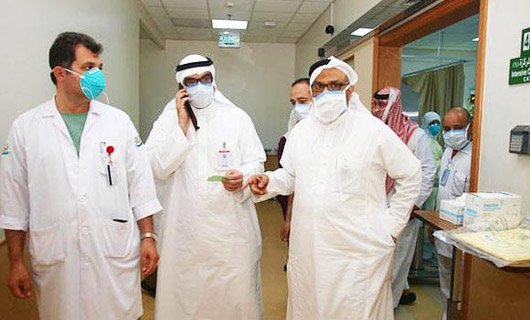
Riyadh/Jeddah, Apr 17: Experts from the World Health Organization (WHO) will arrive in the Kingdom on April 28 to investigate the Middle East Respiratory Syndrome (MERS) coronavirus outbreak in the country.
This comes after the National Scientific Committee for Infectious Diseases (NSCID) held a teleconference with WHO officials in Geneva and Cairo on Tuesday, according to an official from the Ministry of Health.
MERS has killed 71 people and infected 205 since September 2012. There have been 37 infections at Jeddah hospitals recently. Around 2,500 blood samples were tested for the virus in the western province, the official said.
Meanwhile, addressing a meeting on Wednesday in Jeddah, Health Minister Dr. Abdullah Al-Rabeeah said that the NSCID has organized field visits in Jeddah to get first-hand information about the virus. “Hundreds of samples are being tested throughout the Kingdom from suspected cases,” the minister said.
He was speaking at the fifth consultative meeting of senior health officials, the ministry's key strategy meeting.
Al-Rabeeah said compensation is under consideration for all medical workers treating people with infectious diseases. “These officials are doing an excellent service for the sake of the nation,” he said.
The minister said that according to the WHO, there is no cure for coronavirus infections. However, he said the ministry has the situation under control and urged people not to panic or spread rumors about the outbreak.
Al-Rabeeah said the sudden outbreak of the virus in Jeddah was mainly due to the weather changing from winter to spring. The ministry has taken steps at all hospitals in the city to tackle cases of coronavirus and other infections, he said.
Sami Badawood, Jeddah Health Affairs director, told Arab News on Wednesday that face masks do not protect people against the coronavirus.
“While it is true that wearing a face mask can, to some extent, prevent the spread of influenza and other communicable diseases, and protect lungs from dust during sandstorms, masks cannot stop the spread of the coronavirus,” Badawood said.
“However, the coronavirus is also not considered a communicable disease,” he said. “Patients can only become infected after direct contact with an infected patient.”
“The Health Ministry in Jeddah adheres to international standards and World Health Organization norms to treat cases,” he said. “The ministry has established a special unit to follow up on cases around the clock. Officials have ascertained that the situation is completely normal after careful observation and extensive follow-ups.”
“Umrah pilgrims need not panic since there have been no cases reported from being in large crowds,” said Badawood. “In fact, there has not been a single case among pilgrims in Makkah so far.”
Health Minister Abdullah Al-Rabeeah, Makkah Gov. Prince Mishaal bin Abdullah and Jeddah Gov. Prince Mishaal bin Majid are closely following up on the situation, and the ministry is using state-of-the-art technology to analyze samples collected from patients suspected to be infected with the virus,” he said.
He said people on social media have blown the outbreak "out of proportion." "The ministry has also not found that any of the cases can be traced to camels.”






Comments
Add new comment